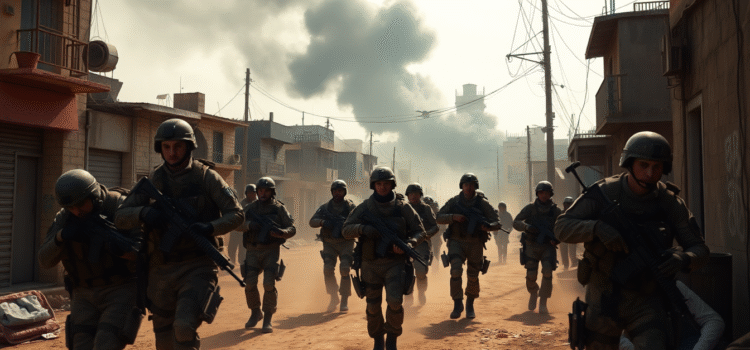
Israeli Troops Mobilize Amid Intense Gaza Gunfire: Casualties Escalate in Ongoing Conflict
The Middle East once again finds itself in the throes of heightened tensions as Israeli forces mobilize in response to escalating violence in the Gaza Strip. Following days of intense Gaza gunfire, the casualties continue to mount on both sides, creating a dire situation. Over 200 fatalities have been reported, with approximately 1,500 individuals injured, marking one of the deadliest escalations in recent years.
This blog post delves deeply into the current state of affairs, unpacking the implications of the Israeli military mobilization, the humanitarian crisis unfolding in Gaza, and the diplomatic efforts striving for peace. Explore the complexities of the ongoing Israel-Gaza clashes and the impact on civilians caught in this relentless cross-border conflict.
Escalation of Conflict: Origins and Recent Developments
The escalation of conflict between Israel and the Gaza Strip has reached alarming levels, with intense Gaza gunfire becoming an almost daily occurrence. The rapid mobilization of Israeli troops along the Gaza border marks a significant defensive posture, aimed at countering the over 500 rockets launched into Israeli territory. Despite the Iron Dome’s interception capabilities, some missiles have struck densely populated areas, leading to increased casualties in the Gaza conflict.
Humanitarian Crisis in Gaza
As Israeli forces conduct airstrikes aimed at demolishing militant sites, the humanitarian crisis in Gaza deepens. Dozens of reported fatalities from these strikes exacerbate the already dire situation. Infrastructure damage has left significant parts of the Gaza Strip with severely reduced access to essential services. International bodies are raising urgent calls for relief efforts to assist those impacted by this violence in Gaza strip.
Diplomatic Efforts and Israel Defense Strategies
Amid calls for de-escalation, international actors are doubling down on diplomatic efforts to halt the violence. Yet, the tension within the region remains precarious. Israel defense strategies continue to emphasize countering aggression while balancing international pressures for moderating military operations in Gaza.
- Ongoing Israel-Gaza Clashes: Expect continuous conflict unless diplomatic interventions create a sustainable ceasefire.
- Humanitarian Impact: The continuous strikes raise critical concerns about the long-term impact on regional security in the Middle East.
- International Response: Strategic diplomatic negotiations are urgent for stabilizing the Israeli-Palestinian relations.
Conclusion
The horrific toll of the ongoing Israel-Gaza conflict underscores the desperate need for both immediate action to protect civilians and sustained diplomatic engagement. The cross-border hostilities follow a familiar yet tragic pattern—escalating violence followed by international outcry and a push for peace. L invite you to reflect on the current Gaza crisis and explore possibilities for constructive dialogue that can pave the way for lasting peace in the region.
Engage in the discussion by leaving your comments below. Share your thoughts on the ongoing conflict and potential solutions to mitigate the human toll in this troubled region.
FAQ
What is the current status of the Israeli military mobilization along the Gaza border?
The Israeli military has significantly mobilized its forces along the Gaza border as part of its defense strategy in response to intensified violence and rocket attacks from the Gaza Strip.
How severe is the humanitarian crisis in Gaza?
The humanitarian crisis in Gaza has become dire with significant casualties and infrastructural damage, reducing access to essential services and escalating the need for international humanitarian aid.
What diplomatic efforts are underway to de-escalate the Israel-Gaza conflict?
Numerous international bodies are actively engaged in diplomatic negotiations aiming to broker a ceasefire and promote dialogue as a means to de-escalate ongoing tensions between Israel and the Gaza Strip.








Comments